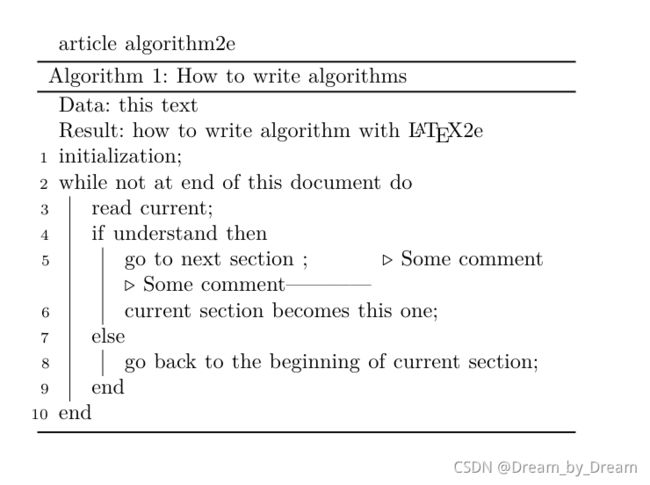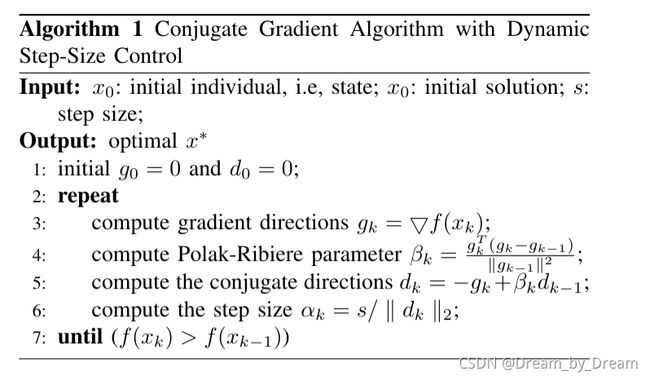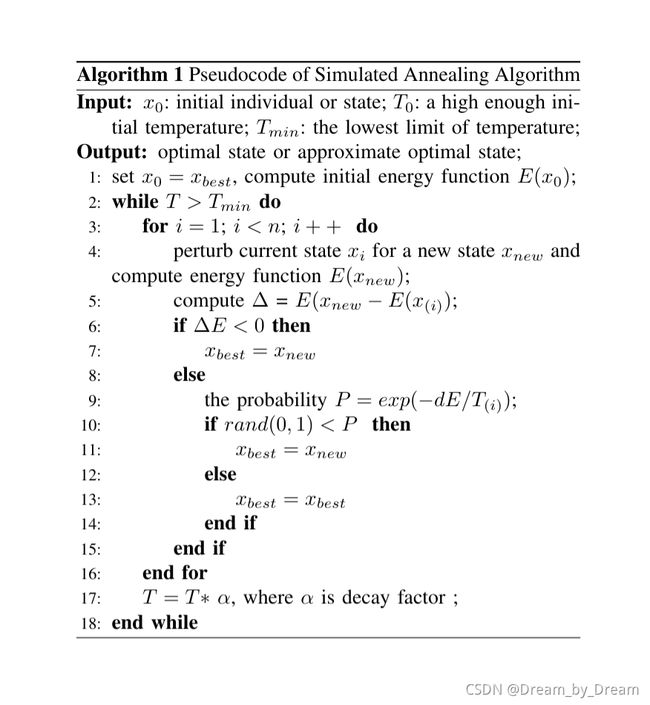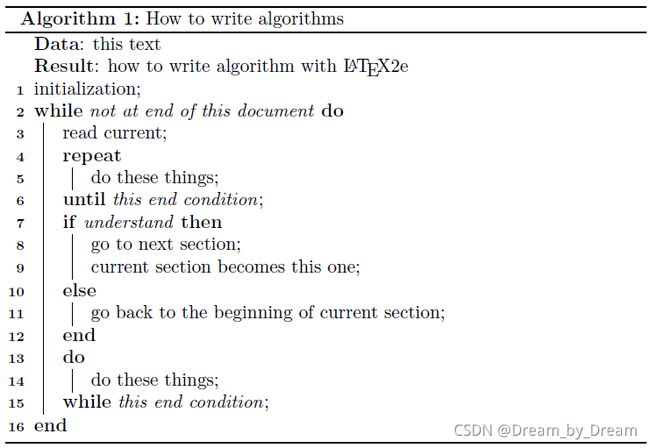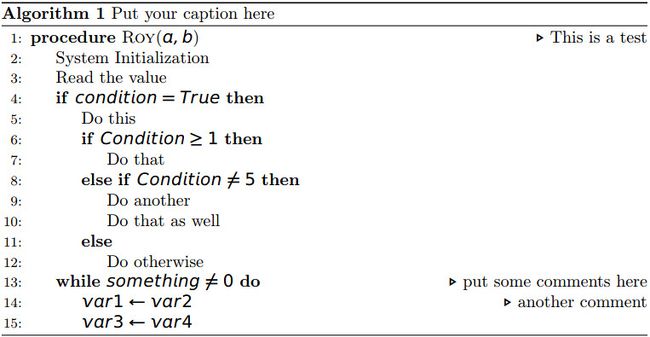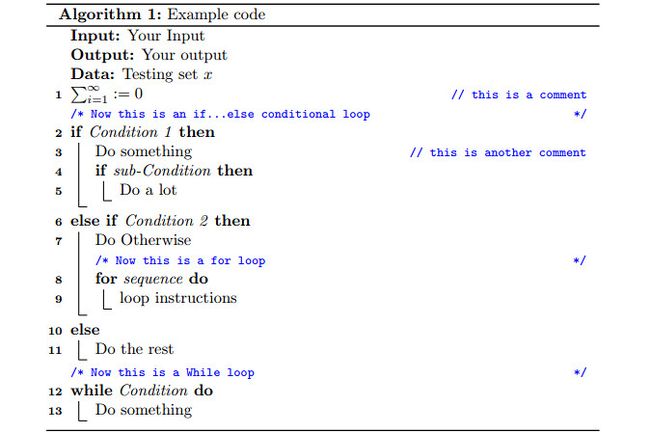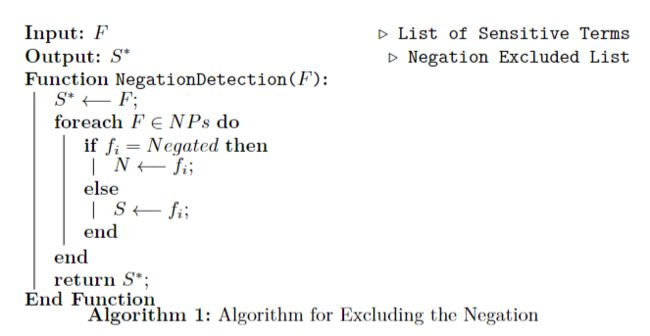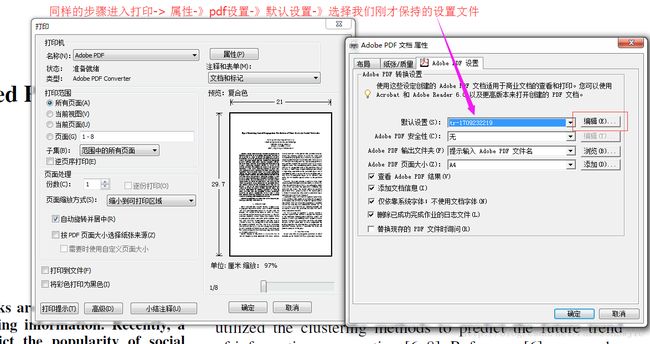Latex 相关命令及官方文档
推荐官方文档,里面例子很多!
algorithm2e官方文档
Introduction to LaTeX on Linux: https://linuxconfig.org/introduction-to-latex-on-linux
Mac 下vs code无法找到latex命令
文章目录
- 相关内容
- LaTeX/命令词汇表
- LaTeX中设置字体颜色的三种方式
- 长公式换行及对齐
- 伪代码
-
- 加注释
- 伪代码例子
- Code using algorithm packagePermalink
- Code using algorithm2e package
- Write Function within Algorithm
- eps转pdf
- pdf去白边
- Letax转Word
- 设置参考文献
- 引用跳转
- 表格
- 合并单元格
- Latex figure 引用显示错误
- 插图片:垂直排版
- IEEE论文检测的字体未嵌入问题Times New Roman
- 注意事项
相关内容
- Gnuplot绘图
LaTeX/命令词汇表
里面记录了大量命令的解释:https://en.wikibooks.org/wiki/LaTeX/Command_Glossary
LaTeX中设置字体颜色的三种方式
https://blog.csdn.net/meiqi0538/article/details/105978246
\usepackage{color}
1.使用系统自定义的颜色
使用语法:
\textcolor{red/blue/green/black/white/cyan/magenta/yellow}{text}
其中:
{red/blue/green/black/white/cyan/magenta/yellow}为系统自定义的颜色。
{text}为需要着色的文字内容。
例如:
\textcolor{red}{AIAS编程有道}、\textcolor{blue}{AIAS编程有道}、\textcolor{yellow}{AIAS编程有道}、\textcolor{green}{AIAS编程有道}
2.使用RGB组合值设置颜色
使用语法:
\textcolor[rgb]{r,g,b}{text}
\textcolor[RGB]{R,G,B}{text}
其中:
[rgb]设置\textcolor选用rgb配色方案;
{r,g,b}代表red、green和blue三种颜色的组合,取值范围为[0-1]
{text}为需要着色的文字内容。
{R,G,B}代表red、green和blue三种颜色的组合,取值范围为[0-255]
例如:
\textcolor[rgb]{0.5,0.6,0.7}{AIAS编程有道}、\textcolor[rgb]{0.5,0.8,0.7}{AIAS编程有道}、\textcolor[rgb]{0.1,0.8,0.9}{AIAS编程有道}
3.自定义一种颜色,直接调用
自定义方式1:
\definecolor{ColorName}{rgb}{r,g,b}
这时r/g/b的定义域就在[0-1],可参考方法2。
\definecolor{ColorName}{RGB}{R,G,B}
这时R/G/B的定义域就在[0-255],可参考方法2。
这里为颜色定义了名称ColorName,下面可以直接调用这个颜色方案即可。
调用方式:\textcolor{ColorName}{text}。操作方式可参考方法2。
长公式换行及对齐
方法1
\begin{equation}
\begin{aligned}
\theta ^{*},\theta ^{'*}&= \argmin\limits_{\theta,\theta^{'}}\frac{1}{n}\sum_{n}^{i=1}L\left (\textbf{x}^{(i)},\textbf{x}^{'(i)} \right )\\
&=\argmin\limits_{\theta,\theta^{'}}\frac{1}{n}\sum_{n}^{i=1}L\left (\textbf{x}^{(i)},g_{\theta ^{'}}\left ( f_{\theta }\left ( \textbf{x}^{i}\right )\right )\right )
\end{aligned}
\label{f2}
\end{equation}
方法2
https://blog.csdn.net/yangguangdblu/article/details/78790723
长公式换行用\,对齐用&,宏包\usepackage{amsmath}
\begin{equation*}%加*表示不对公式编号
\begin{split}
PMV =&[0.303*exp(-0.036M)+0.0275]*\{M-W-3.05*[5.733-\\
&0.007(M-W)-P_a]-0.42*(M-W-58.2)-0.0173M*\\
&(5.867-P_a)-0.0014M*(34-t_a)-3.96*10^-8*f_cl*[(t_cl+\\
&273)^4-(t_r+273)^4]-f_cl*h_c*(t_cl-t_a)\}
\end{split}
\end{equation*}
伪代码
加注释
\documentclass{article}
\usepackage{algorithm2e}
\SetKwComment{Comment}{$\triangleright$\ }{}
\begin{document}
\begin{algorithm}[H]
\SetAlgoLined
\KwData{this text}
\KwResult{how to write algorithm with \LaTeX2e }
initialization\;
\While{not at end of this document}{
read current\;
\eIf{understand}{
go to next section \Comment*[r]{Some comment}
\Comment{Some comment------------}
current section becomes this one\;
}{
go back to the beginning of current section\;
}
}
\caption{How to write algorithms}
\end{algorithm}
\end{document}
伪代码例子
Latex写算法伪代码
1.模板一
\documentclass[conference]{IEEEtran}
\usepackage{algorithm}
\usepackage{algpseudocode}
\usepackage{amsmath}
\begin{document}
%% 写算法伪代码或者流程的前期准备
\renewcommand{\algorithmicrequire}{\textbf{Input:}} % Use Input in the format of Algorithm
\renewcommand{\algorithmicensure}{\textbf{Output:}} % Use Output in the format of Algorithm
\begin{algorithm}[h]
\caption{Conjugate Gradient Algorithm with Dynamic Step-Size Control} % 名称
\label{alg::conjugateGradient}
\begin{algorithmic}[1]
\Require
$x_0$: initial individual, i.e, state;
$x_0$: initial solution;
$s$: step size;
\Ensure
optimal $x^{*}$
\State initial $g_0=0$ and $d_0=0$;
\Repeat
\State compute gradient directions $g_k=\bigtriangledown f(x_k)$;
\State compute Polak-Ribiere parameter $\beta_k=\frac{g_k^{T}(g_k-g_{k-1})}{\parallel g_{k-1} \parallel^{2}}$;
\State compute the conjugate directions $d_k=-g_k+\beta_k d_{k-1}$;
\State compute the step size $\alpha_k=s/\parallel d_k \parallel_{2}$;
\Until{($f(x_k)>f(x_{k-1})$)}
\end{algorithmic}
\end{algorithm}
\end{document}
\documentclass[conference]{IEEEtran}
\usepackage{algorithm}
\usepackage{algorithm}
\usepackage{algorithmicx}
\usepackage{algpseudocode}
\usepackage{amsmath}
\usepackage[top=2cm, bottom=2cm, left=2cm, right=2cm]{geometry}
\begin{document}
%% 写算法伪代码或者流程的前期准备
\renewcommand{\algorithmicrequire}{\textbf{Input:}} % Use Input in the format of Algorithm
\renewcommand{\algorithmicensure}{\textbf{Output:}} % Use Output in the format of Algorithm
\begin{algorithm}[h]
\caption{Pseudocode of Simulated Annealing Algorithm} % 名称
\begin{algorithmic}[1]
\Require
$x_0$: initial individual or state;
$T_0$: a high enough initial temperature;
$T_{min}$: the lowest limit of temperature;
\Ensure
optimal state or approximate optimal state;
\State set $x_0 = x_{best}$, compute initial energy function $E(x_0)$;
\While {$T > T_{min}$}
\For{$i = 1$; $i\documentclass{article}
\usepackage[linesnumbered, ruled]{algorithm2e}
\SetKwRepeat{Do}{do}{while}%
\begin{document}
\begin{algorithm}[H]
\KwData{this text}
\KwResult{how to write algorithm with \LaTeX2e }
initialization\;
\While{not at end of this document}{
read current\;
\Repeat{this end condition}{
do these things\;
}
\eIf{understand}{
go to next section\;
current section becomes this one\;
}{
go back to the beginning of current section\;
}
\Do{this end condition}{
do these things\;
}
}
\caption{How to write algorithms}
\end{algorithm}
\end{document}
Code using algorithm packagePermalink
https://shantoroy.com/latex/how-to-write-algorithm-in-latex/
\documentclass[a4paper]{article}
\usepackage[margin=1.5in]{geometry} % For margin alignment
\usepackage[english]{babel}
\usepackage[utf8]{inputenc}
\usepackage{algorithm}
\usepackage{arevmath} % For math symbols
\usepackage[noend]{algpseudocode}
\title{Algorithm template}
\author{Roy}
\date{\today} % Today's date
\begin{document}
\maketitle
\section{Demo code}
\begin{algorithm}
\caption{Put your caption here}
\begin{algorithmic}[1]
\Procedure{Roy}{$a,b$} \Comment{This is a test}
\State System Initialization
\State Read the value
\If{$condition = True$}
\State Do this
\If{$Condition \geq 1$}
\State Do that
\ElsIf{$Condition \neq 5$}
\State Do another
\State Do that as well
\Else
\State Do otherwise
\EndIf
\EndIf
\While{$something \not= 0$} \Comment{put some comments here}
\State $var1 \leftarrow var2$ \Comment{another comment}
\State $var3 \leftarrow var4$
\EndWhile \label{roy's loop}
\EndProcedure
\end{algorithmic}
\end{algorithm}
\end{document}
Code using algorithm2e package
\documentclass{article}
\usepackage{xcolor}
\usepackage[linesnumbered,ruled,vlined]{algorithm2e}
\title{Another algorithm template}
\author{Roy}
%%% Coloring the comment as blue
\newcommand\mycommfont[1]{\footnotesize\ttfamily\textcolor{blue}{#1}}
\SetCommentSty{mycommfont}
\SetKwInput{KwInput}{Input} % Set the Input
\SetKwInput{KwOutput}{Output} % set the Output
\begin{document}
\maketitle
\begin{algorithm}[!ht]
\DontPrintSemicolon
\KwInput{Your Input}
\KwOutput{Your output}
\KwData{Testing set $x$}
$\sum_{i=1}^{\infty} := 0$ \tcp*{this is a comment}
\tcc{Now this is an if...else conditional loop}
\If{Condition 1}
{
Do something \tcp*{this is another comment}
\If{sub-Condition}
{Do a lot}
}
\ElseIf{Condition 2}
{
Do Otherwise \;
\tcc{Now this is a for loop}
\For{sequence}
{
loop instructions
}
}
\Else
{
Do the rest
}
\tcc{Now this is a While loop}
\While{Condition}
{
Do something\;
}
\caption{Example code}
\end{algorithm}
\end{document}
Write Function within Algorithm
第一种风格:
\begin{algorithm}[H]
\SetKwInput{KwInput}{Input} % Set the Input
\SetKwInput{KwOutput}{Output} % set the Output
\DontPrintSemicolon
\KwInput{Your Input}
\KwOutput{Your output}
\KwData{Testing set $x$}
% Set Function Names
\SetKwFunction{FMain}{Main}
\SetKwFunction{FSum}{Sum}
\SetKwFunction{FSub}{Sub}
% Write Function with word ``Function''
\SetKwProg{Fn}{Function}{:}{}
\Fn{\FSum{$first$, $second$}}{
a = first\;
b = second\;
sum = first + second\;
\KwRet sum\;
}
\;
% Write Function with word ``Def''
\SetKwProg{Fn}{Def}{:}{}
\Fn{\FSub{$first$, $second$}}{
a = first\;
b = second\;
sum = first - second\;
\KwRet sum\;
}
\;
\SetKwProg{Fn}{Function}{:}{\KwRet}
\Fn{\FMain}{
a = 5\;
b = 10\;
Sum(5, 10)\;
Sub(5, 10)\;
print Sum, Sub\;
\KwRet 0\;
}
\end{algorithm}
\documentclass{article}
\usepackage{algorithm2e}
\SetKwComment{Comment}{$\triangleright$\ }{}
\begin{document}
\begin{algorithm}[H]
\SetAlgoLined %设置线型,\SetAlgoLined becomes the default, see section 9.6 for explanations about the \SetAlgoLined
macros
\DontPrintSemicolon
\KwIn{$ F $\Comment*[r]{List of Sensitive Terms}}
\KwOut{$ S^{*} $ \Comment*[r]{Negation Excluded List}}
\SetKwFunction{FMain}{NegationDetection}
\SetKwProg{Fn}{Function}{:}{}
\Fn{\FMain{$F$}}{
$ S^{*} \longleftarrow F $;
\ForEach{$ F \in NPs $}
{\eIf{$ f_i = Negated $}
{$ N \longleftarrow f_i;$}
{$ S \longleftarrow f_i;$}
}
\textbf{return} $ S^{*}; $
}
\textbf{End Function}
\caption{Algorithm for Excluding the Negation}
\label{NagetionAlgo}
\end{algorithm}
\end{document}
eps转pdf
epstopdf ${figname}.eps ${figname}.pdf
echo "finish ${figname}.eps -> ${figname}.pdf"
pdfcrop ${figname}.pdf # 去白边
mv ${figname}-crop.pdf ${figname}.pdf
pdf去白边
1.ubuntu上安装软件
sudo apt install texlive-extra-utils
pdfcrop ${figname}.pdf # 去白边
2.在线工具
https://pdfresizer.com/crop/6b5c7b2d7784.pdf
Letax转Word
pandoc
sudo apt-get install pandoc
# pandoc
# eq-1
pandoc input.md -o output.docx -w docx --pdf-engine xelatex
# eq-2
pandoc input.tex -o output.docx -w docx --reference-doc ref.docx --pdf-engine xelatex
其中 <files> 为输入的内容,其输入即可以来自文件,也可以来自标准输入甚至网页链接。而 <options> 为参数选项。
主要的参数选项有:
-f <format>、-r <format>:指定输入文件格式,默认为 Markdown;
-t <format>、-w <format>:指定输出文件格式,默认为 HTML;
-o <file>:指定输出文件,该项缺省时,将输出到标准输出;
--highlight-style <style>:设置代码高亮主题,默认为 pygments;
-s:生成有头尾的独立文件(HTML,LaTeX,TEI 或 RTF);
-S:聪明模式,根据文件判断其格式;
--self-contained:生成自包含的文件,仅在输出 HTML 文档时有效;
--verbose:开启 Verbose 模式,用于 Debug;
--list-input-formats:列出支持的输入格式;
--list-output-formats:列出支持的输出格式;
--list-extensions:列出支持的 Markdown 扩展方案;
--list-highlight-languages:列出支持代码高亮的编程语言;
--list-highlight-styles:列出支持的代码高亮主题;
-v、--version:显示程序的版本号;
-h、--help:显示程序的帮助信息。
虽然 Pandoc 提供了用于指定输入输出格式的参数,但是很多时候该参数不必使用。Pandoc 已经足够聪明到可以根据文件名判断输入输出格式,所以除非文件名可能造成歧义,否则这两个参数都可以省略。
设置参考文献
摘抄自: LaTeX格式模板四-参考文献的引用
第一种引用方式如下图,缺点就是当参考论文较多时管理麻烦。
\begin{thebibliography}{99}
\bibitem{索引名1} Fowler M. Refactoring: improving the design of existing code[M]. Pearson Education India, 1999.\\
\bibitem{索引名2} Guo Y, Seaman C, Zazworka N, et al. Domain-specific tailoring of code smells: an empirical study[C]//Proceedings of the 32nd ACM/IEEE International Conference on Software Engineering-Volume 2. ACM, 2010: 167-170.
\end{thebibliography}
第二种引用方式如下图,只有简短的两句话。那些参考文献则在liu.bib这个文件中,这个文件的格式是BitTex格式,JabRef对这些文献可以按BitTex的格式进行整理。 bibliographystyle花括号中的unsrt的意思是让引用的论文在参考文献部分按引用的先后顺序排序。
对于JabRef的使用和bibliographystyle花括号中的参数{在生成的论文PDF中这些引用到的论文如何排序的方式,是按字母排序还是引用先后},网上的介绍更详细,这里只是做个简单的介绍。
\bibliographystyle{unsrt}
\bibliography{liu}
反正最后的显示效果都是这样
附注小点:前引号
打引号的时候,前引号会变得跟后引号一样吗,这时候要用 ``(Tab键上面的那个键),敲两遍那个键就可以了。
附注:论文中标点符号
要符合默认规定,要空格,大家可以看一下别人的论文,每个标点符号后都要空一格。
参考:
IEEE Trans LaTex模板参考文献格式
\bibliographystyle格式对比
引用跳转
有的latex模板中的引用点击之后不能直接跳转,故需要自己导入要给包:
\usepackage[backref]{hyperref} % 引用会边框
\usepackage[hidelinks]{hyperref} % 去掉边框
表格
\begin{table}[!t]
\caption{Table Head}
%\vspace{-0.1in}
\label{tab:data}
\centering
\footnotesize
{\renewcommand{\arraystretch}{1.2}
% \setlength{\tabcolsep}{3pt} %colums
\begin{tabular}{l| c |c| c }
% \toprule
\hline
\hline % 与上面的线重合加粗,注意需要与上面的\hline之间加一个空行
{\textbf{RR}} &
{\textbf{NN}} &
{\textbf{BB}} &
{\textbf{FF}} \\
\hline
bbb~\cite{b} & 50,636,154 & 1,949,412,601 & 33GB \\
\hline
aaa~\cite{a} & 3 & 2 & 1 \\
% \bottomrule
\hline
\hline
\end{tabular}
}
\vspace{-0.1in}
\end{table}
合并单元格
注意: 如果出现合并后线重合或者出现多出线条,考虑是否是\multicolumn{2}{|c|}{\multirow{2}*{合并两行两列}}里面的|c|中|的影响。
- https://blog.csdn.net/wzxlovesy/article/details/69063271
\documentclass[a4paper,12pt]{report}
\usepackage[UTF8,nopunct]{ctex}
\usepackage{multirow}
\begin{document}
\begin{table}
\centering
\begin{tabular}{|c|c|c|c|}
\hline
\multicolumn{2}{|c|}{\multirow{2}*{合并两行两列}} & 三 & 四 \\
\cline{3-4}
\multicolumn{2}{|c|}{~} & 3 & 4 \\
\hline
\end{tabular}
\end{table}
\end{document}
————————————————
版权声明:本文为CSDN博主「TheNetAdmin」的原创文章,遵循CC 4.0 BY-SA版权协议,转载请附上原文出处链接及本声明。
原文链接:https://blog.csdn.net/wzxlovesy/article/details/69063271
\documentclass[a4paper,12pt]{report}
\usepackage[UTF8,nopunct]{ctex}
\begin{document}
\begin{table}
\centering
\begin{tabular}{|c|c|c|c|}
\hline
\multicolumn{2}{|c|}{合并一行两列} & 三 & 四 \\
\hline
1 & 2 & 3 & 4 \\
\hline
\end{tabular}
\end{table}
\end{document}

2. 更复杂的:
参考:https://blog.csdn.net/weixin_41519463/article/details/103737464

\begin{table*}[t]
\centering
\caption{MAP scores of teacher model, different student models with 4 widths and three baseline models with different length of binary codes on CIFAR-10 and SUN datasets.}
\label{table1}
\begin{tabular}{|c|c|c|c|c|c|c|c|c|c|c|c|}
\hline
\multicolumn{2}{|c|}{\multirow{2}{*}{Model}} &\multirow{2}{*}{FLOPs}&\multirow{2}{*}{Params} & \multicolumn{4}{c|}{CIFAR-10}&\multicolumn{4}{c|}{SUN}\\
\cline{5-12}
\multicolumn{2}{|c|}{} & & & 12bits & 24bits & 32bits & 48bits & 12bits & 24bits & 32bits & 48bits \\
\hline
\multicolumn{2}{|c|}{Teacher} &4.12G &25.56M &0.87841 &0.89512 &0.9014 &0.90601 &0.83587 &0.85736 &0.86297 &0.87103\\
\hline
%0.25x-----------------
\multirow{4}{*}{$0.25\times$} & Stu-1 & 0.15G & 1.03M &
0.70746 & 0.73458 & 0.74909 & 0.75833 & 0.69618 & 0.76631 & 0.78075 & 0.78787 \\
\cline{2-12}
\multirow{4}{*}{} & Stu-2 &0.19G &1.08M &0.7629 &0.79111 &0.80039 &0.80519 &0.73539 &0.79714 &0.80753 &0.81195\\
\cline{2-12}
\multirow{4}{*}{} & Stu-3 &0.26G &1.43M &0.84684 &0.86443 &0.87384 &0.88268 &0.79284 &0.83442 &0.84350 &0.84353\\
\cline{2-12}
\multirow{4}{*}{} & Stu-4 & 0.29G &1.99M &0.85901 &0.87269 &0.8836 &0.88728 &0.81997 &0.84620 &0.85041 &0.85036\\
\hline
\end{tabular}
\label{table_MAP}
\end{table*}
Latex figure 引用显示错误
一般是因为 \caption 和\label 的相对位置不对。
记住:\label 一定要放在 \caption 后面,一般caption的根据图/表/算法的类型是相对固定的。
参考: https://blog.csdn.net/D_turtle/article/details/83005105
插图片:垂直排版
\begin{figure}
\vspace{-0.2in}
\centering
\subfloat[PageRank]{\label{fig:compress_ratio_pr}\hsp
\includegraphics[scale=0.40]{fig/compress_rate_pr.eps}}
% \\
% \vspace{-0.2in}
\subfloat[SSSP]{\label{fig:compress_ratio_sssp}\hsp
\includegraphics[scale=0.40]{fig/compress_rate_sssp.eps}}
\vspace{-0.2in}
\caption{Compression ratio and algorithm running time as a function of compression factor.}
\label{fig:compress_ratio}
\vspace{-0.1in}
\end{figure}
IEEE论文检测的字体未嵌入问题Times New Roman
参考:
- IEEE论文检测的字体未嵌入问题Times New Roman,Bold, Times New Roman,Italic is not embedded解决方法
- EDAS字体嵌入问题解决方法
投 IEEE的会议论文时,有些会议要求一定要投pdf格式的文档,而且所有字体一定要embeded,所谓字体embeded就是把这种字体嵌入文档,那么 以后即使这个文档在其他任何系统下打开,无论该系统有没有这个字体,都不会出现乱码,可移植性比较强,当然嵌入后文档体积会有所增大。
首先告诉大家如何看自己的pdf文档字体是否嵌 入:在pdf格式的文件中,点“文件”-> “文档属性”-> “字体”,显示的就是你文档中用的所有字体了,每一个字体后面,如果注明了“embeded(已嵌入)”或“embeded subset(已嵌入子集)”,就说明是嵌入了,否则就要想办法。
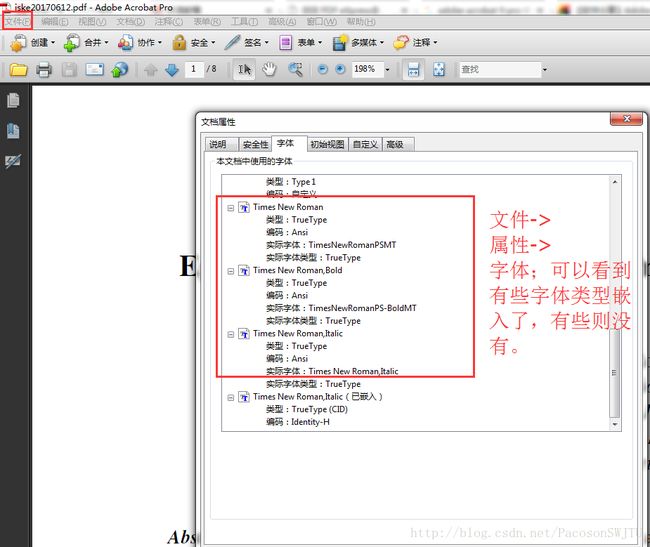
下面是一个更简单的方法:
1.用acrobat打开不满足要求的pdf文档
2.打印,选择Adobe PDF打印机,
3.点击属性,Adobe PDF 设置
4.点"编辑"按钮
5.在最左边点击"字体"——“添加名称”,然后输入Helvetica,选择总是嵌入列表,然后添加、完成。(出现问题一般都是Matlab,莫名其妙的默认字体Helvetica!)
6. 点击确认,保存到和文件同一个文件夹下即可。
7. 最后打印,选择Adobe PDF打印机,再打印就大功告成了!!
注意事项
- lable: 命名中不要带下划线.


